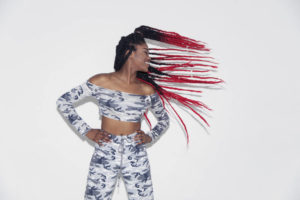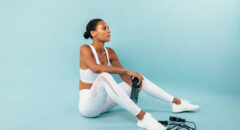 We often neglect working out or going to the gym to preserve our hairstyles and beauty regimens. From my own experiences, this is a choice more Black women make than any other race. Since four out of five Black women in the U.S. are obese, you’d think health would be more important than a perceived standard of beauty.
We often neglect working out or going to the gym to preserve our hairstyles and beauty regimens. From my own experiences, this is a choice more Black women make than any other race. Since four out of five Black women in the U.S. are obese, you’d think health would be more important than a perceived standard of beauty.
I hear often enough amongst women that they rather not sweat their hair out in the gym because it costs too much time, money, and energy to get it styled again. Although, that sounds reasonable if one is sacrificing daily physical activity to maintain an outward appearance, their inner health and well being will suffer. It is no secret a healthy diet and exercise in combination can prevent illness and disease, so the choice to inactively participate because of hair can have negative impacts on overall wellness.
It is concerning to know that after all the years we’ve struggled with our hair we continue to hold ourselves hostage to European beauty standards. There are other ways of maintaining hairstyles that allow for a more active lifestyle, however, those styles may not be preferred because they are natural styles; braids, ponytails, twists, afro, locs, etc.
There are corporate environments that do not prefer Black women to wear their natural hair because it is seen as a “distraction” or as unprofessional, this is another reason why it is discouraging and hard to make changes with our hair because we have allowed industries to ban what it looks like in its natural state.
Social media and various other social platforms like the music or modeling industry, display straight hair and European textured hair as the norm for women of color. Experimenting with hair and wigs is a fun way to express who you are and can also be used as an extension of your personality but it should never replace a consistently healthy, active lifestyle. Now more than ever there are so many resources to finding workout-friendly hairstyles that are cost-effective and beneficial in reaching your fitness goals.
If we continue to prioritize our hair and beauty standards before daily physical activity then we will continue to suffer from obesity, type I and II diabetes, hypertension, and a host of cardiovascular linked diseases. We have to learn our hair and learn what works for our hair and part of knowing what works for our hair is knowing what is working for our bodies first. For example; if you suffer from hair loss and or alopecia most likely you would not be a good candidate for a relaxer.
Applying a relaxer in this condition can cause worse effects on the body internally and externally. This is an example of how prioritizing a “look” or standard of beauty you wish to have is less important than maintaining the health of your hair and scalp. If you did apply the relaxer the chances of the quality of your hair and scalp being healthy are slim.
Or another example is if you simply keep choosing not to participate in physical activity because you don’t want to sweat your hair out. I have fell victim to using my hair as an excuse for not going to the gym and I consciously know, making this excuse is not going to lead me down a healthy quality of life. It is recommended the average person get a minimum of 150+ minutes of moderate to vigorous activity a week to maintain weight, lean muscle, balanced pressure, blood sugar and to prevent cardiovascular disease.
Hair is only one of the many reasons 4 out of 5 Black women in America are obese hence the lack thereof support, facilities, education, and safety for at-risk environments. There are centuries of pain and hurt surrounding Black hair and if we can begin to spread more awareness about how beneficial it can be to our wellness we can reverse the disease and illness amongst our sisters, mothers, daughters, aunties, and nieces.
There is already a stigma around Black women in the fitness industry as there is a huge lack of representation. There is some truth in that representation, in that Black women are least likely toengage in daily physical activity. However, the more barriers we can break down together, the sooner we can turn around the statistics. One of the main barriers I’ve come across is black hair in America. Black women have struggled tremendously with identifying with their hair and we should let ourselves free of the psychological damages it still causes.
Artist, India Arie, is an inspiration and a walking billboard for women embracing their hair but not using it as a crutch to define her. Her debut song ‘I Am Not My Hair’ relieves women of feeling like they even need hair at all to be beautiful. Her message is “I am the soul that lives within” and this message should be spread amongst all women and girls that hair does not define their beauty but the person that they are and the character that they possess does.
She is open and aware that people may not agree with her choice of hairstyle but she will choose what is best for her regardless of the opinions of others. India Arie embodies someone who decided to be healthy in her choice of hairstyle, she did not continue to allow her hair to hinder her from being her best self.
-Knikki Kyser, KyzFit, 2018. ACE Certified Personal Trainer.
Cited
Dr. Lisa K. Fitzpatrick, MD, MPH, MPA, Hair Before Health: How the Beauty Industry Is Fueling The Obesity Epidemic. August, 2018. <https://www.huffingtonpost.com/entry/hair-before-health-how-the-beauty-industry-is-fueling_us_57c02eefe4b06384eb3effb8>








